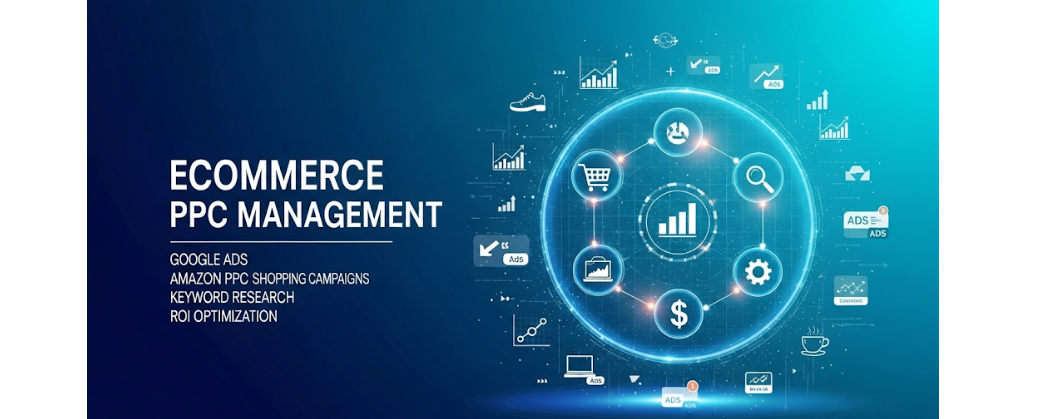Through platforms like Google, Facebook, and Amazon, ecommerce PPC management is the strategic creation and optimization of sponsored advertisements to enhance online sales, create targeted traffic and improve product exposure.
E-commerce PPC Management: What Is It?
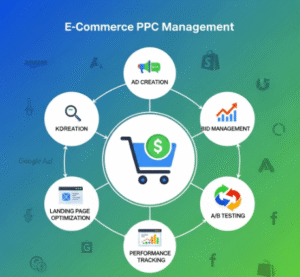
The practice of managing, refining, and expanding paid advertising campaigns for online retailers is known as ecommerce PPC management. In order to market items and draw in ready-to-buy clients, this entails controlling ad expenditure across platforms such as Google Ads, Microsoft Ads, Facebook, Instagram, and Amazon.
PPC is one of the most economical advertising formats when used correctly since marketers only pay when customers click on their adverts.
Why PPC in E-Commerce Is Crucial for Online Stores
Relying only on organic traffic is insufficient in a field as competitive as e-commerce. This is why PPC is important:
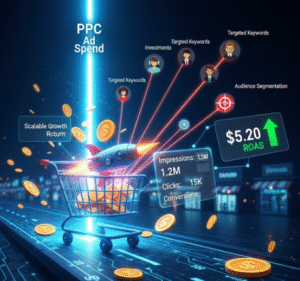
- Instant Visibility: Search engine results show ads at the top, drawing attention fast.
- Highly Targeted: PPC solutions provide accurate audience targeting according to search intent, geography, interests, and demographics.
- Scalable Outcomes: PPC campaigns may grow with your objectives, regardless of how many things you sell—ten thousand or ten thousand.
- Trackable ROI: PPC is one of the most data-rich marketing channels as each click, impression, and conversion can be measured.
Essential Elements of Effective PPC Management in E-Commerce
There is considerably more to managing e-commerce PPC campaigns than just running advertisements. The essential elements of a high-performing strategy are listed below:
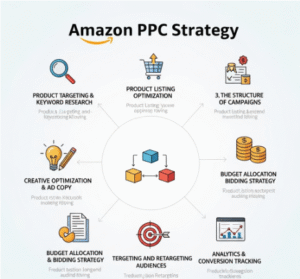
1. Product Targeting & Keyword Research
The key to PPC success is selecting the appropriate keywords. Utilize tools like as Ahrefs, SEMrush, or Google Keyword Planner to find search phrases that your target audience uses.
- For example, “buy wireless headphones” or “affordable gaming laptop” are transactional terms.
- To capture targeted intent, concentrate on long-tail keywords.
- Use ASIN targeting to outbid rivals on comparable items on sites like Amazon.
2. Product Listing Optimization
Only when PPC traffic results in a conversion is it effective. You need to optimize your product pages for conversion.
- Product descriptions and names that are clear
- High-quality pictures
- Good feedback from customers
- Simple checkout procedure
- Mobile-friendly layout
3. The Structure of Campaigns
Ad performance and budget allocation are enhanced by a well-planned PPC campaign:
- Campaigns that are distinct by brand or product category
- Create ad groups by grouping related keywords.
- To evaluate performance, run several match kinds (precise, phrase, and wide).
4. Creative Optimization & Ad Copy
Effective ad wording has the power to make or ruin your PPC campaigns. Your advertisements ought to:
- Emphasize your special selling characteristics.
- Add pertinent keywords.
- Provide discounts or promotions.
- Make use of attention-grabbing CTAs such as “Limited Offer” or “Shop Now.”
Invest in top-notch creatives for visual channels like Facebook and Instagram; lifestyle photos and videos are the most effective.
5. Budget Allocation & Bidding Strategy
Based on your objective, select the appropriate bidding model:
- Complete control over cost-per-click (CPC) is provided by manual bidding.
- Automated Bidding: Maximizes conversions using machine learning
- Return on ad expenditure is maximized via ROAS-based bidding.
Test various budgets across a number of campaigns, evaluate results, and adjust according to return on investment.
6. Targeting and Retargeting Audiences
Strong audience segmentation is possible with contemporary PPC platforms:
- Targeting cold traffic involves reaching out to potential clients based on their preferences and actions.
- Retargeting: Show advertisements to those who came to your website but did not buy.
- Lookalike audiences: Look for new users who are similar to your current clientele.
Because many consumers do not convert on their initial visit, retargeting is particularly successful in e-commerce.
7. Analytics & Conversion Tracking
Conversion tracking may be set up using:
- Conversion tracking for Google Ads
- Goals for Google Analytics and eCommerce monitoring
- API for Meta Conversion or Facebook Pixel
- Integrations with WooCommerce or Shopify for tracking
Observe KPIs like:
- Click-through rate (CPC)
- Rate of click-through (CTR)
- Rate of conversion (CR)
- ROI (return on ad expenditure)
Examine these analytics on a regular basis to improve your efforts.
Top Platforms for PPC Advertising in E-Commerce
Selecting the appropriate platform may have a significant impact. The following are some excellent options for e-commerce PPC:
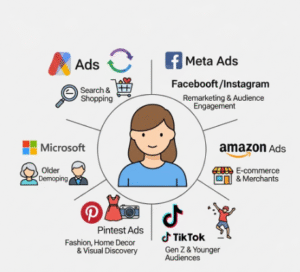
- For intent-based targeting with Search and Shopping Ads, Google Ads is the best option.
- Facebook and Instagram meta ads are great for remarketing and visual storytelling.
- Microsoft Ads: Excellent for targeting older populations, less competition
- Amazon Ads: Essential for Amazon merchants
- Pinterest Ads: Popular for fashion and leisure items
- TikTok ads are excellent for reaching younger people and Gen Z.
To find out where your audience is most engaged, spread your advertising budget over a variety of media.
Typical Errors in PPC Management for E-Commerce
To save time and money, steer clear of these pitfalls:
- Using uncontrolled broad match keywords
- Not making landing or product pages more optimized
- Disregarding mobile optimization
- Ignoring A/B testing
- Negative keywords not being excluded
- Allowing campaigns to continue without any modifications
Tested Strategies to Boost E-Commerce PPC Outcomes
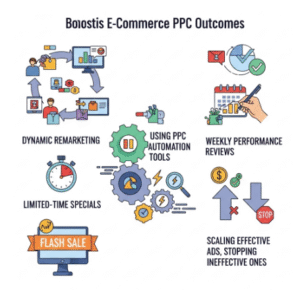
- Display customized product advertisements using dynamic remarketing.
- Use limited-time and seasonal specials.
- Use PPC technologies such as Adalysis, WordStream, or Optmyzr to automate activities.
- Review performance every week.
- Stop ineffective advertisements and scale effective ones.
Advantages of Using a PPC Management Specialist
Consider working with a professional or agency to handle PPC marketing if you lack the time or expertise to do it yourself. Advantages consist of:
- Planning and implementing a strategy
- Reduced waste from ad spend
- Continuous optimization
- Availability of cutting-edge resources and insights
- Increased ROAS
Seek out accredited experts who have worked with e-commerce systems before.
Concluding remarks
Online shopping PPC management involves constant monitoring, analysis, and strategy improvement; it is not a work that can be set and forgotten. PPC advertising has the potential to significantly increase your online store’s earnings when done properly.
Every stage is essential, from audience targeting and ROI tracking to keyword research. The secret to long-term e-commerce success is being proactive and knowledgeable, regardless of whether you employ a professional or handle campaigns in-house.
Ecommerce PPC Management Frequently Asked Questions
1. What is ecommerce PPC?
In order to increase traffic and sales, online merchants use the PPC (Pay-Per-Click) e-commerce paid advertising approach, whereby they pay for each click on their adverts.
2. What makes PPC crucial to e-commerce?
Compared to organic marketing, PPC increases exposure, draws in ready-to-buy clients, and produces quantifiable results more quickly.
3. What are the top platforms for PPC e-commerce?
Google Ads, Facebook Ads, Instagram, Amazon Ads, and Microsoft Ads are some of the best platforms.
4. What is the price of e-commerce PPC?
Budgets can start as little as $10 per day, while costs vary according on the sector, level of competition, and target audience.
5. In PPC, what is ROAS?
Return on Ad Spend, or ROAS, calculates how much money is made for each dollar spent on advertisements.
6. How should I pick keywords for PPC e-commerce?
To identify product-specific, high-intent keywords with a high search volume, use tools such as Google Keyword Planner.
7. Describe negative terms.
Negative keywords improve relevancy and save money by preventing your advertising from appearing for irrelevant queries.
8. How long does it take to get PPC results?
While consistent performance usually requires two to four weeks of tuning, some gains can be observed in a matter of days.
9. Should I employ a professional or do PPC myself?
Hiring a PPC expert or agency can boost performance and return on investment if you lack experience.
10. Is it possible for PPC to lower cart abandonment?
Retargeting advertisements do have the ability to increase conversions by bringing back customers who abandoned things in their carts.
